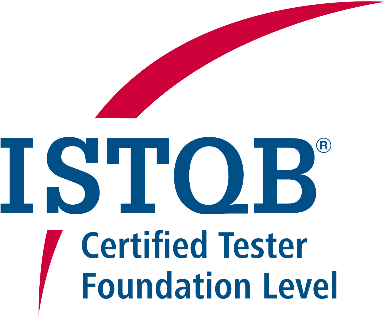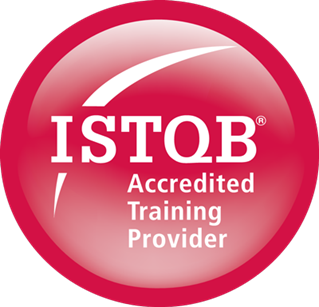Software Tester Certification Foundation Level—ISTQB CTFL
An ISTQB® Accredited Course with the ASTQB Proficiency Distinction™


Accredited training for the ISTQB® Certified Tester—Foundation Level (CTFL) certification, aligned to the newest syllabus. Find out what it takes to be a successful software tester and gain practical knowledge you can apply now.
Class Schedule
Upcoming Public Sessions
- Learn the fundamentals of software testing including key concepts and context, testing principles and test process, and the human factors in testing.
- Explore the relationship of testing to development in the software development lifecycle, compare test levels and test types, and understand the triggers and impact of maintenance testing.
- Understand the value of static testing while exploring different static and dynamic techniques, and learn the most common review types and how to use these approaches to find defects.
- Examine test design techniques including black-box testing, white-box testing, and experienced-based testing.
- Delve deep into test management, exploring test organization, test planning and estimation, configuration management, risk-based testing, defect management, and more.
- Explore tool support for testing including tool selection, benefits, risks, and classifications.
Developed and delivered by leading experts in the testing industry, Software Tester Certification—Foundation Level is an accredited training course to prepare you for the ISTQB Certified Tester—Foundation Level (CTFL) exam. Certification demonstrates a knowledge of software testing and is based on a Body of Knowledge and examination guidelines that are applied consistently across the world. It focuses on test concepts and techniques that can apply to all software projects, including agile projects, other types of iterative and incremental lifecycles, and in sequential lifecycles.
Going above and beyond the ISTQB syllabus, this course provides practical knowledge you can apply now. In addition to the fundamentals of software testing, you also learn about the psychology of testing, test and review process, black-box test methods, white-box testing, experienced-based testing, test monitoring and metrics, the benefits and risks of test automation, and more. Gain the basic skills required of a software test professional and learn how testing adds significant value to software development projects.
Who Should Attend?
This course is appropriate for individuals new to software testing, developers
and analysts expected to test within agile teams, and test/QA professionals seeking ISTQB certification in
software testing (CTFL). Common job functions include testers, test engineers, QA professionals, test managers,
project leaders, quality analysts, and more.
Benefits of Certification
The International
Software Testing Qualifications Board (ISTQB) is a non-proprietary organization that has granted nearly 700,000
certifications in more than 120 countries around the globe. This program is the only internationally-accepted certification
for software testing accredited through its network of national boards.
ISTQB certification is designed for software professionals who need to demonstrate practical knowledge of the fundamental concepts of testing—test designers, test analysts, test engineers, test consultants, test managers, user acceptance testers, and developers—as well as those who need a basic understanding of software testing, such as project managers, quality managers, development managers, business analysts, IT directors, and management consultants.
CTFL certification is good in perpetuity. Once a professional has earned the certification, they retain the credentials even if the criteria are updated. In addition, CTFL holders with verifiable experience can extend their certification with the ISTQB's Advanced-Level certifications or qualify their competencies in agile testing, security testing, test automation, and more.
ASTQB Proficiency Distinction™
ASTQB Proficiency Distinction courses are accredited to include intensive, well defined,
hands-on interactive exercises based on realistic scenarios. These exercises must go above and beyond what is required by ISTQB so
that candidates are exposed to the concepts in a deep and meaningful way.
Exam Guarantee
Course registrants
who do not pass the exam within 60 days of completing either an On-Site, Public Classroom, or Live Virtual course will be given free
access to a Live Virtual course for additional learning. Reach out to us via the
Contact Us Page or call +1.609.975.9294
.
- Easy course access: Attend training right from your computer and easily connect your audio via computer or phone. Easy and quick access fits today ís working style and eliminates expensive travel and long days in the classroom.
- Live, expert instruction: Instructors are sought-after practitioners, highly-experienced in the industry who deliver a professional learning experience in real-time.
- Valuable course materials: Courses cover the same professional content as our classroom training, and students have direct access to valuable materials.
- Rich virtual learning environment: A variety of tools are built in to the learning platform to engage learners through dynamic delivery and to facilitate a multi-directional flow of information.
- Hands-on exercises: An essential component to any learning experience is applying what you have learned. Using the latest technology, your instructor can provide hands-on exercises, group activities, and breakout sessions.
- Real-time communication: Communicate real-time directly with the instructor. Ask questions, provide comments, and participate in the class discussions.
- Peer interaction: Networking with peers has always been a valuable part of any classroom training. Live Virtual training gives you the opportunity to interact with and learn from the other attendees during breakout sessions, course lecture, and Q&A.
- Small class size: Live Virtual courses are limited in small class size to ensure an opportunity for personal interaction.
Contact Us
Reach out to us via a channel specified below.

- For public sessions discount requests, select "Discounts Info" from the class list, choose the discounts tab then complete the request process. You can then use the instructions below to contact us if you do not get a rapid response.
- For any request or question please use our Contact Us Form. You may also follow up via phone or email using the information provided below.
- We offer live phone support, between 9:00 AM ET to 5:30 PM ET US. Please use the Contact Us Form prior to calling us at +1.609.975.9294 so we can have your information to reference.
- You may also contact us via email. Please use the Contact Us Form prior to sending an email at Grow-Lean-Training@Grow-Lean.com.